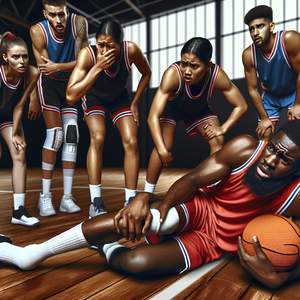Inspiring Journeys of Paralympic Powerlifters

For many Paralympic powerlifters, their journey is shaped by the challenges they faced due to their disabilities. Take the example of Jessy, a young woman who lost her leg in a car accident. Initially grappling with her new reality, Jessy found solace and strength in the gym. The weight room became her sanctuary, a place where she could channel her grief into something productive. With the unwavering support of her family and a dedicated coach, she transformed her sorrow into motivation. Today, not only does Jessy compete at the Paralympic level, but she also serves as an inspiration for countless others facing similar hardships, proving that the human spirit can rise from even the darkest of places. Similarly, Amir’s story highlights the power of adaptability. A former athlete who became paralyzed from the waist down due to a sports injury, Amir initially faced an uncertain future. Instead of letting his dreams fade, he discovered powerlifting as a new passion. His journey emphasizes the importance of viewing challenges as opportunities rather than obstacles. Through countless hours of training and a steadfast refusal to give up, Amir has crafted a place for himself among the elite athletes in the sport, embodying the belief that resilience is key to overcoming adversity.
Finding Community and Support
Community plays a crucial role in the lives of Paralympic powerlifters. The support systems they build around themselves—whether through family, friends, or fellow athletes—are vital to their success. Many powerlifters highlight the importance of camaraderie in the sport. For instance, Sarah, who has been competing for over a decade, shares how the friendships she formed with other athletes helped her through tough times. The emotional support, motivation, and sense of belonging that come from these relationships are crucial for athletes navigating the pressures of competition. The powerlifting community also fosters a culture of inclusivity and encouragement. Athletes often share training tips, celebrate each other's milestones, and come together to advocate for disability sports. These bonds can be life-changing; they help athletes like Sarah and Jessy push their limits and achieve their goals. The powerlifting community is not just a group of competitors; it is a family that uplifts each other, reinforcing the idea that together, they can achieve greatness.
Training and Dedication: The Path to Excellence
The road to the Paralympics is paved with rigorous training and unwavering dedication. Paralympic powerlifters often have to adapt their training regimens to fit their specific abilities and needs. Many athletes work with specialized coaches who understand the complexities of adaptive sports. Take David, for example, who was born with muscular dystrophy. He utilizes a unique training approach that focuses on maximizing his upper body strength. His regimen includes not only traditional weightlifting exercises but also tailored movements that enhance his core stability and overall power. David emphasizes that every pound lifted is a victory, symbolizing his hard work, resilience, and commitment to his sport. Nutrition also plays a pivotal role in their preparation. Athletes like Jessy follow tailored meal plans that ensure they have the energy and nutrients necessary for optimal performance. This attention to detail in both training and nutrition showcases the level of commitment these athletes have, underscoring that success in powerlifting is not just about lifting weights but about a holistic approach to health and fitness.
The journeys of Paralympic powerlifters are filled with challenges and triumphs that transcend the sport itself. Each athlete’s story serves as an inspiration, reminding us that strength is not solely measured in physical prowess but in the ability to rise above adversity. As we look forward to the 2024 Paralympics, these athletes embody the spirit of resilience, community, and dedication that defines the essence of competition. Their stories not only challenge stereotypes about disability but also inspire others to pursue their dreams, regardless of the obstacles they may face. The world will be watching, and these athletes will not just lift weights; they will lift spirits and inspire generations to come. In doing so, they remind us all that the human spirit knows no bounds and that perseverance can lead to extraordinary achievements. The 2024 Paralympics will not only be a platform for competition but also a celebration of courage, hope, and the unyielding desire to achieve greatness against all odds.
Adaptive Sports Program Coordinator
Non-profit organizations, community sports centers, rehabilitation facilities
Core Responsibilities
Develop and implement adaptive sports programs tailored for individuals with disabilities.
Organize community outreach initiatives to promote participation in adaptive sports.
Collaborate with coaches, athletes, and families to ensure a supportive environment.
Required Skills
Strong understanding of disability sports and adaptive training techniques.
Excellent communication and organizational skills.
Experience in program development or event planning.
Sports Nutritionist specializing in Paralympic Athletes
Sports teams, fitness centers, private practices, athletic organizations
Core Responsibilities
Design and implement individualized nutrition plans that cater specifically to the needs of Paralympic athletes.
Conduct assessments to monitor athletes' nutritional status and performance.
Educate athletes on nutrition principles and their impact on training and recovery.
Required Skills
Degree in nutrition or dietetics, with a focus on sports nutrition preferred.
Familiarity with the unique dietary needs of athletes with disabilities.
Certification as a Registered Dietitian Nutritionist (RDN) or similar credential.
Certified Strength and Conditioning Specialist (CSCS) for Adaptive Athletes
Sports performance facilities, rehabilitation centers, collegiate athletic programs
Core Responsibilities
Design and implement strength and conditioning programs tailored for athletes with disabilities.
Assess athletes' physical capabilities and adapt training regimens accordingly.
Monitor progress and adjust training plans to optimize performance while minimizing injury risk.
Required Skills
Certification as a CSCS or similar credential from a recognized organization.
Knowledge of biomechanics and adaptive training techniques.
Experience working with individuals with diverse physical abilities.
Disability Sports Advocate
Non-profits, advocacy organizations, government agencies
Core Responsibilities
Promote awareness and support for disability sports through community engagement and policy advocacy.
Collaborate with local governments, organizations, and schools to enhance accessibility in sports.
Organize events that spotlight adaptive sports and their benefits.
Required Skills
Strong advocacy and communication skills, with the ability to engage diverse stakeholders.
Knowledge of disability rights and accessibility legislation.
Experience in community organizing or public relations.
Sports Psychologist specializing in Adaptive Sports
Sports teams, rehabilitation facilities, private practices, universities with sports psychology programs
Core Responsibilities
Provide mental performance coaching to Paralympic athletes, focusing on resilience and motivation.
Develop strategies to help athletes cope with the psychological aspects of competition and disability.
Conduct workshops and seminars on mental health and performance enhancement.
Required Skills
Advanced degree in psychology or sports psychology, with licensure if required.
Experience working with athletes with disabilities or in adaptive sports settings.
Strong interpersonal skills and the ability to build trust with clients.


